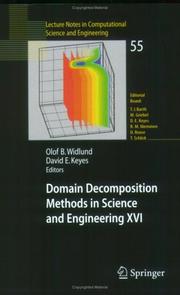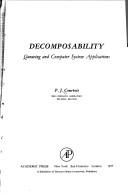Book
ISBN: 9780262514736 0262514737 Year: 2010 Publisher: Cambridge (Mass.) MIT Press
Abstract | Keywords | Export | Availability | Bookmark
 Loading...
Loading...Choose an application
- Reference Manager
- EndNote
- RefWorks (Direct export to RefWorks)
In Discovering Complexity, William Bechtel and Robert Richardson examine two heuristics that guided the development of mechanistic models in the life sciences: decomposition and localization. Drawing on historical cases from disciplines including cell biology, cognitive neuroscience, and genetics, they identify a number of "choice points" that life scientists confront in developing mechanistic explanations and show how different choices result in divergent explanatory models. Describing decomposition as the attempt to differentiate functional and structural components of a system and localization as the assignment of responsibility for specific functions to specific structures, Bechtel and Richardson examine the usefulness of these heuristics as well as their fallibility--the sometimes false assumption underlying them that nature is significantly decomposable and hierarchically organized. When Discovering Complexity was originally published in 1993, few philosophers of science perceived the centrality of seeking mechanisms to explain phenomena in biology, relying instead on the model of nomological explanation advanced by the logical positivists (a model Bechtel and Richardson found to be utterly inapplicable to the examples from the life sciences in their study). Since then, mechanism and mechanistic explanation have become widely discussed. In a substantive new introduction to this MIT Press edition of their book, Bechtel and Richardson examine both philosophical and scientific developments in research on mechanistic models since 1993.
Research --- Decomposition method --- Localization theory --- Complexity (Philosophy) --- Methodology --- Decomposition method. --- Localization theory. --- Methodology. --- 168.5 --- Multidisciplinair karakter der wetenschappen --- Categories (Mathematics) --- Homotopy theory --- Nilpotent groups --- Method, Decomposition --- Operations research --- Programming (Mathematics) --- System analysis --- Philosophy --- Emergence (Philosophy) --- Recherche --- Décomposition (méthode mathématique) --- Localisation, Théorie de la --- Complexité (philosophie) --- methodologie
Book
ISBN: 1282978365 9786612978364 0262289172 0262514737 9780262289177 9780262514736 0691087628 9780691087627 Year: 2010 Publisher: Cambridge, Massachusetts : The MIT Press,
Abstract | Keywords | Export | Availability | Bookmark
 Loading...
Loading...Choose an application
- Reference Manager
- EndNote
- RefWorks (Direct export to RefWorks)
"In Discovering Complexity, William Bechtel and Robert Richardson examine two heuristics that guided the development of mechanistic models in the life sciences: decomposition and localization. Drawing on historical cases from disciplines including cell biology, cognitive neuroscience, and genetics, they identify a number of 'choice points' that life scientists confront in developing mechanistic explanations and show how different choices result in divergent explanatory models. Describing decomposition as the attempt to differentiate functional and structural components of a system and localization as the assignment of responsibility for specific functions to specific structures, Bechtel and Richardson examine the usefulness of these heuristics as well as their fallibility--the sometimes false assumption underlying them that nature is significantly decomposable and hierarchically organized. When Discovering Complexity was originally published in 1993, few philosophers of science perceived the centrality of seeking mechanisms to explain phenomena in biology, relying instead on the model of nomological explanation advanced by the logical positivists (a model Bechtel and Richardson found to be utterly inapplicable to the examples from the life sciences in their study). Since then, mechanism and mechanistic explanation have become widely discussed. In a substantive new introduction to this MIT Press edition of their book, Bechtel and Richardson examine both philosophical and scientific developments in research on mechanistic models since 1993"--MIT CogNet.
Research --- Decomposition method. --- Localization theory. --- Complexity (Philosophy) --- Decomposition method --- Localization theory --- Physical Sciences & Mathematics --- Sciences - General --- Methodology. --- Methodology --- Method, Decomposition --- Philosophy --- Emergence (Philosophy) --- Categories (Mathematics) --- Homotopy theory --- Nilpotent groups --- Operations research --- Programming (Mathematics) --- System analysis --- PHILOSOPHY/Philosophy of Science & Technology --- Philosophy of science --- Research - Methodology. --- Research - Methodology

ISBN: 1280960353 9786610960354 3540344691 3540344683 Year: 2007 Publisher: Berlin, Heidelberg : Springer Berlin Heidelberg : Imprint: Springer,
Abstract | Keywords | Export | Availability | Bookmark
 Loading...
Loading...Choose an application
- Reference Manager
- EndNote
- RefWorks (Direct export to RefWorks)
Domain decomposition is an active, interdisciplinary research area concerned with the development, analysis, and implementation of coupling and decoupling strategies in mathematical and computational models of natural and engineered systems. Since the advent of hierarchical distributed memory computers, it has been motivated by considerations of concurrency and locality in a wide variety of large-scale problems, continuous and discrete. Historically, it emerged from the analysis of partial differential equations, beginning with the work of Schwarz in 1870. The present volume sets forth new contributions in areas of numerical analysis, computer science, scientific and industrial applications, and software development.
Decomposition method --- Differential equations, Partial --- Method, Decomposition --- Operations research --- Programming (Mathematics) --- System analysis --- Engineering. --- Computer science --- Computer science. --- Engineering, general. --- Computational Mathematics and Numerical Analysis. --- Computational Science and Engineering. --- Numerical and Computational Physics, Simulation. --- Mathematics of Computing. --- Mathematics. --- Informatics --- Science --- Computer mathematics --- Discrete mathematics --- Electronic data processing --- Construction --- Industrial arts --- Technology --- Mathematics --- Computer mathematics. --- Physics. --- Computer science—Mathematics. --- Natural philosophy --- Philosophy, Natural --- Physical sciences --- Dynamics
Book
ISBN: 204009945X 9782040099459 Year: 1974 Volume: 4 Publisher: Paris Dunod
Abstract | Keywords | Export | Availability | Bookmark
 Loading...
Loading...Choose an application
- Reference Manager
- EndNote
- RefWorks (Direct export to RefWorks)
Numerical analysis --- Mathematical physics --- Mathematical optimization --- Iterative methods (Mathematics) --- Decomposition (Mathematics) --- Decomposition method --- 517 --- Optimization (Mathematics) --- Optimization techniques --- Optimization theory --- Systems optimization --- Mathematical analysis --- Maxima and minima --- Operations research --- Simulation methods --- System analysis --- Iteration (Mathematics) --- Method, Decomposition --- Programming (Mathematics) --- Analysis --- 517 Analysis --- Economics, Mathematical --- Mathématiques économiques --- Mathématiques économiques. --- Analyse numérique. --- Economics, Mathematical. --- Mathématiques économiques --- Analyse numérique --- Numerical analysis. --- Formes quadratiques --- Programmation mathematique --- Programmation non lineaire
Book
ISBN: 9783319117133 3319117122 9783319117126 3319117130 Year: 2015 Publisher: Cham : Springer International Publishing : Imprint: Springer,
Abstract | Keywords | Export | Availability | Bookmark
 Loading...
Loading...Choose an application
- Reference Manager
- EndNote
- RefWorks (Direct export to RefWorks)
This monograph has two main objectives. The first one is to give a self-contained exposition of the relevant facts about set operads, in the context of combinatorial species and its operations. This approach has various advantages: one of them is that the definition of combinatorial operations on species, product, sum, substitution and derivative, are simple and natural. They were designed as the set theoretical counterparts of the homonym operations on exponential generating functions, giving an immediate insight on the combinatorial meaning of them. The second objective is more ambitious. Before formulating it, authors present a brief historic account on the sources of decomposition theory. For more than forty years decompositions of discrete structures have been studied in different branches of discrete mathematics: combinatorial optimization, network and graph theory, switching design or boolean functions, simple multi-person games and clutters, etc.
Mathematics. --- Special Functions. --- Complex Systems. --- Operator Theory. --- Operator theory. --- Functions, special. --- Mathématiques --- Théorie des opérateurs --- Mathematics --- Physical Sciences & Mathematics --- Calculus --- Operads. --- Decomposition method. --- Computer science --- Categories (Mathematics) --- Category theory (Mathematics) --- Computer mathematics --- Discrete mathematics --- Electronic data processing --- Method, Decomposition --- Special functions. --- System theory. --- Algebra, Homological --- Algebra, Universal --- Group theory --- Logic, Symbolic and mathematical --- Topology --- Functor theory --- Operations research --- Programming (Mathematics) --- System analysis --- Functional analysis --- Special functions --- Mathematical analysis --- Systems, Theory of --- Systems science --- Science --- Philosophy
Book
ISBN: 3642113036 9786612973819 1282973819 3642113044 Year: 2011 Publisher: Berlin, Heidelberg : Springer Berlin Heidelberg : Imprint: Springer,
Abstract | Keywords | Export | Availability | Bookmark
 Loading...
Loading...Choose an application
- Reference Manager
- EndNote
- RefWorks (Direct export to RefWorks)
These are the proceedings of the 19th international conference on domain decomposition methods in science and engineering. Domain decomposition methods are iterative methods for solving the often very large linear or nonlinear systems of algebraic equations that arise in various problems in mathematics, computational science, engineering and industry. They are designed for massively parallel computers and take the memory hierarchy of such systems into account. This is essential for approaching peak floating point performance. There is an increasingly well-developed theory which is having a direct impact on the development and improvement of these algorithms.
Decomposition method. --- Differential equations, Partial. --- Electronic books. -- local. --- Civil & Environmental Engineering --- Mathematics --- Engineering & Applied Sciences --- Physical Sciences & Mathematics --- Operations Research --- Mathematics - General --- Mathematics. --- Computer science --- Computer mathematics. --- Physics. --- Computational Mathematics and Numerical Analysis. --- Computational Science and Engineering. --- Numerical and Computational Physics. --- Mathematics of Computing. --- Natural philosophy --- Philosophy, Natural --- Physical sciences --- Dynamics --- Computer mathematics --- Discrete mathematics --- Electronic data processing --- Math --- Science --- Partial differential equations --- Method, Decomposition --- Operations research --- Programming (Mathematics) --- System analysis --- Computer science. --- Numerical and Computational Physics, Simulation. --- Informatics --- Computer science—Mathematics.

ISBN: 0898712882 9780898712889 Year: 1992 Publisher: Philadelphia (Pa.): SIAM
Abstract | Keywords | Export | Availability | Bookmark
 Loading...
Loading...Choose an application
- Reference Manager
- EndNote
- RefWorks (Direct export to RefWorks)
Decomposition method --- Differential equations, Partial --- Décomposition (Méthode mathématique) --- Equations aux dérivées partielles --- Congresses --- Congrès --- Congresses. --- -Differential equations, Partial --- -519.6 --- 681.3 *G18 --- Partial differential equations --- Method, Decomposition --- Operations research --- Programming (Mathematics) --- System analysis --- Computational mathematics. Numerical analysis. Computer programming --- Partial differential equations: difference methods; elliptic equations; finite element methods; hyperbolic equations; method of lines; parabolic equations (Numerical analysis) --- 681.3 *G18 Partial differential equations: difference methods; elliptic equations; finite element methods; hyperbolic equations; method of lines; parabolic equations (Numerical analysis) --- 519.6 Computational mathematics. Numerical analysis. Computer programming --- Décomposition (Méthode mathématique) --- Equations aux dérivées partielles --- Congrès --- 519.6 --- Decomposition method - Congresses. --- Differential equations, Partial - Congresses.

ISBN: 012193750X 1322469563 1483217582 9780121937508 Year: 1977 Publisher: New York Academic press
Abstract | Keywords | Export | Availability | Bookmark
 Loading...
Loading...Choose an application
- Reference Manager
- EndNote
- RefWorks (Direct export to RefWorks)
Decomposition (Mathematics) --- Electronic digital computers --- Queuing theory --- Décomposition (Mathématiques) --- Ordinateurs --- Files d'attente, Théorie des --- Evaluation --- Decomposition method --- 519.87 --- -Queuing theory --- 681.3*C4 --- Method, Decomposition --- Operations research --- Programming (Mathematics) --- System analysis --- Erlang traffic formula --- Queueing theory --- Theory of queues --- Waiting-line theory --- Production scheduling --- Stochastic processes --- Automatic digital computers --- Computers, Electronic digital --- Digital computers, Electronic --- Computers --- Hybrid computers --- Sequential machine theory --- Mathematical models for operational research --- Performance of systems (Computer systems organization) --- Decomposition method. --- Queuing theory. --- Evaluation. --- 681.3*C4 Performance of systems (Computer systems organization) --- 519.87 Mathematical models for operational research --- Décomposition (Mathématiques) --- Files d'attente, Théorie des --- Informatique --- Computer science --- Electronic digital computers - Evaluation
Book
ISBN: 3642026761 3642026788 364226025X 364202677X Year: 2009 Publisher: Berlin, Heidelberg : Springer Berlin Heidelberg : Imprint: Springer,
Abstract | Keywords | Export | Availability | Bookmark
 Loading...
Loading...Choose an application
- Reference Manager
- EndNote
- RefWorks (Direct export to RefWorks)
th This volume contains a selection of 41 refereed papers presented at the 18 International Conference of Domain Decomposition Methods hosted by the School of Computer Science and Engineering(CSE) of the Hebrew University of Jerusalem, Israel, January 12–17, 2008. 1 Background of the Conference Series The International Conference on Domain Decomposition Methods has been held in twelve countries throughout Asia, Europe, the Middle East, and North America, beginning in Paris in 1987. Originally held annually, it is now spaced at roughly 18-month intervals. A complete list of past meetings appears below. The principal technical content of the conference has always been mathematical, but the principal motivation has been to make efficient use of distributed memory computers for complex applications arising in science and engineering. The leading 15 such computers, at the “petascale” characterized by 10 oating point operations per second of processing power and as many Bytes of application-addressablem- ory, now marshal more than 200,000 independent processor cores, and systems with many millions of cores are expected soon. There is essentially no alternative to - main decomposition as a stratagem for parallelization at such scales. Contributions from mathematicians, computer scientists, engineers, and scientists are together necessary in addressing the challenge of scale, and all are important to this conference.
Decomposition method -- Congresses. --- Differential equations, Partial -- Congresses. --- Decomposition method --- Differential equations, Partial --- Mathematics --- Civil & Environmental Engineering --- Mathematics - General --- Operations Research --- Engineering & Applied Sciences --- Physical Sciences & Mathematics --- Decomposition method. --- Mathematics. --- Math --- Method, Decomposition --- Computer science --- Computer mathematics. --- Mathematical models. --- Physics. --- Computational Mathematics and Numerical Analysis. --- Mathematical Modeling and Industrial Mathematics. --- Computational Science and Engineering. --- Numerical and Computational Physics. --- Mathematics of Computing. --- Science --- Natural philosophy --- Philosophy, Natural --- Physical sciences --- Dynamics --- Models, Mathematical --- Simulation methods --- Computer mathematics --- Discrete mathematics --- Electronic data processing --- Operations research --- Programming (Mathematics) --- System analysis --- Computer science. --- Numerical and Computational Physics, Simulation. --- Informatics --- Computer science—Mathematics.
Book
ISBN: 1441998861 144199887X Year: 2011 Publisher: New York, NY : Springer New York : Imprint: Springer,
Abstract | Keywords | Export | Availability | Bookmark
 Loading...
Loading...Choose an application
- Reference Manager
- EndNote
- RefWorks (Direct export to RefWorks)
Aside from distribution theory, projections and the singular value decomposition (SVD) are the two most important concepts for understanding the basic mechanism of multivariate analysis. The former underlies the least squares estimation in regression analysis, which is essentially a projection of one subspace onto another, and the latter underlies principal component analysis, which seeks to find a subspace that captures the largest variability in the original space. This book is about projections and SVD. A thorough discussion of generalized inverse (g-inverse) matrices is also given because it is closely related to the former. The book provides systematic and in-depth accounts of these concepts from a unified viewpoint of linear transformations finite dimensional vector spaces. More specially, it shows that projection matrices (projectors) and g-inverse matrices can be defined in various ways so that a vector space is decomposed into a direct-sum of (disjoint) subspaces. Projection Matrices, Generalized Inverse Matrices, and Singular Value Decomposition will be useful for researchers, practitioners, and students in applied mathematics, statistics, engineering, behaviormetrics, and other fields.
Mathematical statistics. --- Matrices. --- Multivariate analysis. --- Multivariate analysis -- Problems, exercises, etc. --- Singular value decomposition --- Matrix inversion --- Algebras, Linear --- Mathematics --- Physical Sciences & Mathematics --- Algebra --- Mathematical Statistics --- Decomposition method. --- Matrix inversion. --- Algebras, Linear. --- Linear algebra --- Inverse matrices --- Inverse of a matrix --- Inversion, Matrix --- Method, Decomposition --- Algebra, Matrix --- Cracovians (Mathematics) --- Matrix algebra --- Matrixes (Algebra) --- Statistics. --- Statistics, general. --- Statistics for Life Sciences, Medicine, Health Sciences. --- Algebra, Universal --- Generalized spaces --- Mathematical analysis --- Calculus of operations --- Line geometry --- Topology --- Linear operators --- Matrices --- Operations research --- Programming (Mathematics) --- System analysis --- Algebra, Abstract --- Generalized inverses --- Statistical analysis --- Statistical data --- Statistical methods --- Statistical science --- Econometrics --- Statistics .

 Search
Search Feedback
Feedback About
About Help
Help News
News